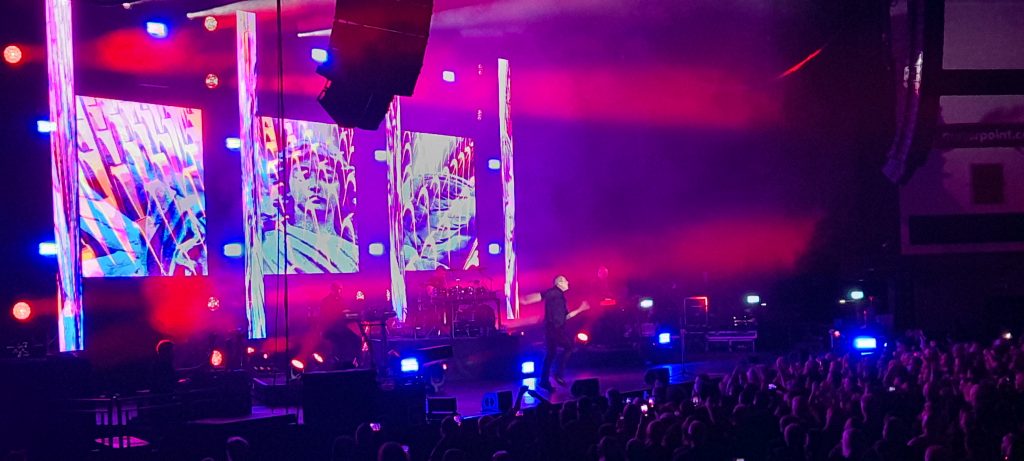Words and Images by Billy Edwards
Orchestral Manoeuvres in the Dark showed little nerves in their first show in Cardiff in twelve years, commanding an eager audience of devoted fans through a breathless flurry of pioneering eighties synth-pop.
The show’s dramatic opening event matched the weather outside with a chillingly-steely video of clanging shipyards and metalworks to the tune of Architecture and Morality, the title instrumental piece from the album of the same name: played in full to mark its 40th anniversary. Soon, the shrouded group, tempted to mount the anxiety which permeates┬átheir most accomplished record, glided over to their places to perform the other instrumental pieces – all without saying a word. A challenging start, perhaps, for plus-ones and casual listeners, but soon Andy McCluskey, the group’s energetic lead singer, introduced OMD with little timidness, hollering at his audience “don’t worry!” about how he’d hoped they’d bought their dancing shoes. They soon delivered on this promise, as the band leapt into the three singles taken from the album. Top-three-hit Souvenir was accompanied by Joan of Arc and Maid of Orleans; all extremely atmospheric, desperately romantic, akin to the sound of falling in love in 1981. It was immensely charming how quickly they established themselves as a band that loved what they played and described facts about the songs, as much fans of their songs as the audience. The polished production of those original records was vividly recreated, with gated drums responsible of the metrical Stewart┬áKershaw, a living argument for why the band defied the drum computers popular at the time, and, note-for-note, what you’d be forgiven for thinking are the same keyboards on the original record, by Martin Cooper and second vocalist and writer, Paul Humphreys, with a┬áhost of glittering melodies.┬á┬á
McCluskey turns his dancing into another instrument. He was visibly itching to bring the moves that have made a name for himself in the group’s long touring history. Twisting,┬ákicking, jumping, jerking: no move was off-limits, sometimes incorporating a sturdy electric or bass guitar. On the funky Locomotion, he went even further than a favourite move of mimicking drums and keys and pretended to be an aeroplane on “fly through the airways”,┬álike an embarrassing Dad who’s had too much at a wedding.┬á┬á

They were also cheeky. At the show’s start, McCluskey, pointing, bemoaned ÔÇÿsomeone’ for refusing to allow the beautifully bittersweet She’s Leaving to be the single it so deserved to be ÔÇô leaving Humphreys squirming to defend himself, blaming his ÔÇÿmaintenance of artistic integrity’. Later, he is introduced by McCluskey to the forefront to sing the Beatlesque (Forever) Live and Die as ÔÇÿthe New Music Express’ choice for thinking woman’s crumpet of┬á1980′, with only a shade of envious derision. Unlike much of the chart from its era, the songs have aged remarkably well. “Dancing in the ruins of the western world, blindfolds on and we don’t care”, sings McCluskey in Georgia, whirling from a jaunty number to an apocalyptic soundscape, suitably in front of a screen depicting Reagan, Thatcher, even┬áStalin; reflecting many of the strong Cold War sentiments found in the album.┬áNearing the conclusion, McCluskey waved his hand and signalled a drumstick to crash down on the cymbals ÔÇô yet it suddenly stopped and hovered, before the unmistakable synthesizer hook of perennial radio favourite Enola Gay began, answered by roars from the crowd, soon swaying, confirmation of its residence as one of the most beloved singles of the 1980s played with aplomb. Such is the quality of their back catalogue that a massive hit wasn’t reserved for the encore, which accurately boasted the scope of their work in three songs. If You Leave, a smart pop number from the John Hughes classic film Pretty in Pink with stage-lighting to match, their very first single Electricity, an electronic work-out released in 1979 when once Kraftwerk-smitten teenagers, and their traditional show closer forty years previously, The Romance of The Telescope, every bit the imaginative epic its title suggests.┬áSerene, passionate and above all fun, OMD entranced an audience of devotees with an unapologetic celebration of their work. It takes a special kind of virtuoso to meld darkly atmospheric synth pieces into entertaining three-minute pop songs, and the evening conserved their mainstay as bouncing with vitality.


